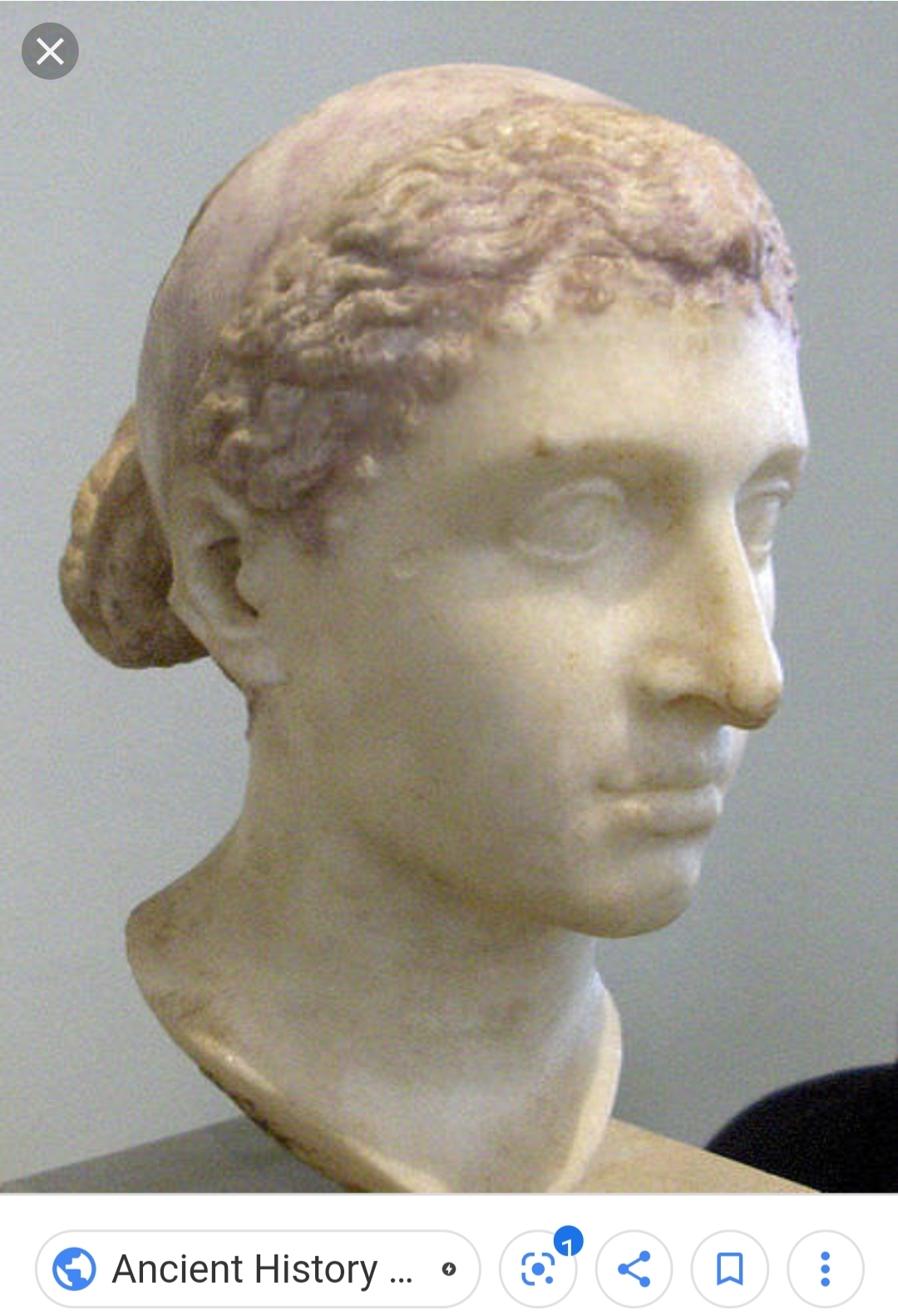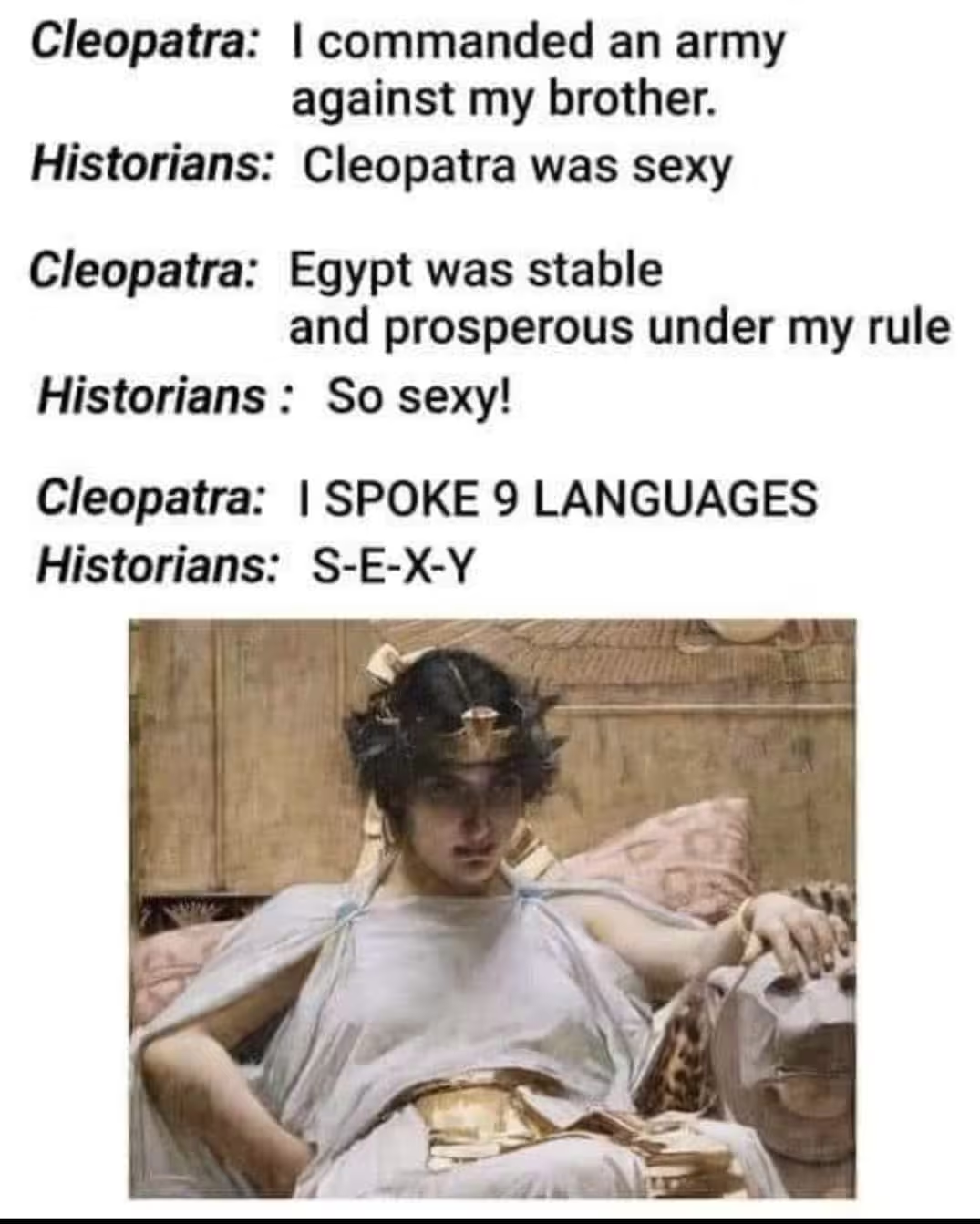


172) Cleopatra VII Philopater
Yes, That Cleopatra
Born: 69 BC, Alexandria, Egypt
Died: 30 BC, Alexandria, Egypt
Cleopatra was an Egyptian Pharaoh who first ruled as co-regent with her two younger brothers (Ptolemy XIII and Ptolemy XIV respectively) and then her oldest son Caesarion (Ptolemy Caesar/ Ptolemy XV).
Cleopatra is widely seen as the last of her dynasty but if you want to get technical her children reigned after her (albeit for literally two weeks but still) ending the Ptolemaic Dynasty after three hundred years and the reign of the Egyptian Pharaohs after thousands of years.
Among Cleopatra's talents were that of knowing various languages; it was reported she was the only Ptolemaic Pharaoh who understood Demotic—the common language of the Egyptians, as well as Greek and Latin.
Cleopatra is best known for her romantic relationships with Julius Caesar and later her husband Marc Antony.
With Caesar she had her son Caesarion (meaning Little Caesar) and with Antony she had three children: the twins Cleopatra Selene and Alexander Helios and then Ptolemy Philadelphos.
In her years as ruler of Egypt Cleopatra faced frequent periods of war and unrest within her borders first from her siblings—including her younger sister Arsinoë, and then from the Romans.
Cleopatra and her son were in Rome when Julius Caesar was assassinated. After his death, Cleopatra took her son and fled back to Egypt. Soon enough however, Marc Antony came into the picture.
The winter Marc Antony spent in Alexandria was interesting to say the least—he and Cleopatra formed a drinking club called the Inimitable Livers (Basically meaning the Unique Livers).
The pair were separated for three years however—during which time Cleopatra gave birth to their twins and Marc married his fourth wife (and Roman Leader Octavian’s sister-in-law) Octavia.
When they met again Antony held an elaborate ceremony called the Donations of Alexandria in which he bestowed vast lands on his Egyptian family. This thoroughly angered the already upset Romans, who viewed Marc Antony's relationship with Cleopatra poorly to say the least.
Also, around this time Cleopatra had her fourth and final child.
In 32 BC, the Roman man Octavian (later to become the first true Roman Emperor) would declare war on Cleopatra after getting pissed at Antony for throwing logic to the wind (from a Roman viewpoint) as I already mentioned above. He had other children and a wife back in Rome too remember? Not saying Antony was a great guy by any means. In any case, Octavian used the Roman people's wrath towards Marc Antony as leverage to declare war on Cleopatra, and in effect Marc Antony as well.
Cleopatra and Antony were defeated at the Battle of Actium soon after. Cleopatra fled the battle and returned back to her palace in Alexandria. Upon returning to Alexandria, Marc Antony killed himself after hearing a rumor that Cleopatra had done the same. It was a false rumor. Cleopatra was still alive; she held her lover in her arms as he died from his own self-inflicted wound.
A few days later, Cleopatra decided she would rather take her life into her own hands rather than become a Roman prisoner. This was most likely a good move on her part. Years earlier, after Julius Caesar had captured Cleopatra's younger sister Arsinoe, he had her paraded through the streets of Rome as a political prisoner for the crowds to jeer at. Cleopatra wanted to avoid that future at all costs.
Cleopatra ended her own life with snake venom, locked away in her own mausoleum. Though Shakespeare would later popularize the myth she had ended her life by allowing an asp to bite her, actual herpetologists who have studied the snakes that were endemic to Egypt at the time disagree. Its more likely Cleopatra ended her life with a hairpin or other sharpened device that was treated with snake venom beforehand.
Sadly, Cleopatra's older son Caesarian was soon murdered by his tutor and her other three children were taken to Rome as prisoners; raised in their father's ex-wife Octavia's household. Cleopatra's sons disappear from history—most likely dying as children, but her daughter went on to become Queen of Mauritania. Cleopatra Selene would die in peace but her only son was then murdered on Caligula’s orders thus ending Cleopatra’s bloodline once and for all.
Badges Earned:
Find a Grave Marked
Located In My Personal Library:
Ancient Egypt: An Introduction by Salima Ikram
Arsinoe of Egypt and Macedon: A Royal Life by Elizabeth Donnelly Carney
Cleopatra by Stacy Schiff
Cleopatra by Susan Blackaby
Cleopatra by Zahi Hawass
Daughters of Isis: Women of Ancient Egypt by Joyce Tyldesley
The Encyclopedia of Ancient Egypt by Helen Strudwick
From Alexander to Cleopatra by Michael Grant
Goddesses, Whores, Wives, and Slaves: Women in Classical Antiquity by Sarah B Pomeroy
The Great Book of Ancient Egypt: In the Realm of the Pharaohs by Zahi Hawass
How They Croaked by Georgia Bragg
Hypatia: The Life and Legend of an Ancient Philosopher by Edward J Watts
Hypatia's Heritage: A History of Women in Science from Antiquity to the Late Nineteenth Century by Margaret Alic
Lost Bodies by Jenni Davis
Lost Cities, Ancient Tombs: 100 Discoveries That Changed the World edited by Ann R Williams
National Geographic History Magazine Article "Antony and Cleopatra" (October/November 2015 Edition)
National Geographic History Magazine Article "Antony & Cleopatra, Taking Liberties With the Queen" (May/June 2017 Edition)
Nefertiti and Cleopatra by Julia Samson
100 Greatest Mysteries: The World's Secrets Revealed (Magazine by History)
One Bloody Thing After Another: The World's Gruesome History by Jacob F Field
The Pharaohs by Dr. Joyce Tyldesley
Princesses Behaving Badly by Linda Rodriguez McRobbie
National Geographic Presents "Queens of Egypt When Women Ruled the World" by Kara Cooney
Religion and Magic in Ancient Egypt by Rosalie David
Secret Egypt by Zahi Hawass
The Warrior Queens by Antonia Fraser
When Women Ruled the World: Six Queens of Egypt by Kara Cooney
Who Knew? Women in History: Questions That Will Make You Think Again by Sarah Herman
The Woman Who Would Be King: Hatshepsut's Rise to Power in Ancient Egypt by Kara Cooney
Women in Ancient Rome by Paul Chrystal
Women in the Valley of the Kings: The Untold Story of Women Egyptologists in the Gilded Age by Kathleen Sheppard
Uppity Women Speak Their Minds by Vicki León
Sources:
All the books listed above

